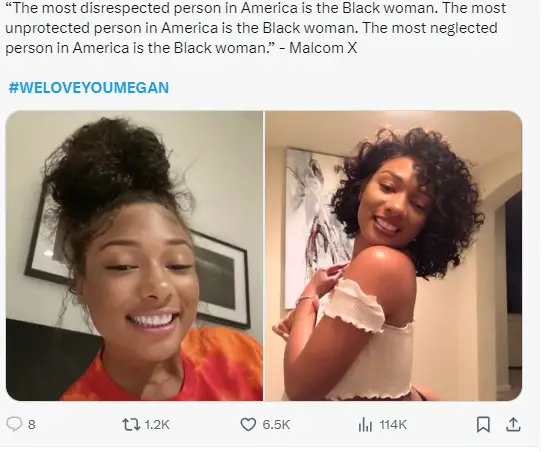Megan Thee Stallion Gets Emotional for AI Sex Video Scandal at Concert

The impact of artificial intelligence on real life continues to deepen. People get great convenience from artificial intelligence, but they also face equal risks. Recently, the famous rapper Megan Thee Stallion became a victim of artificial intelligence. She found herself the protagonist of a deep fake video. This video not only violated her privacy and mental health, but also affected her reputation as a public figure.
Megan Thee Stallion, who was deeply affected by the fake video, cried to fans at a concert about her experience and called for better protection policies.
Table of Contents
What Happened to Megan Thee Stallion?

Megan Thee Stallion recently suffered an emotional breakdown before her concert in Tampa after discovering a deepfake video of herself depicting her as a woman performing indecent acts, which was circulated online by an AI-generated deepfake. The malicious fake video not only spread rapidly on social media, but also sparked outrage among her fans and the public. Although Megan tried to remain calm as she walked onto the stage, the emotional strain of the violation was evident, and her tears reflected how deeply she was affected by the personal attack.
What Are Deepfake and AI-Generated Content?
Deepfakes usually refer to video or audio files produced using artificial intelligence. They can present realistic videos and audios that are very similar to the person, who in fact has never said or done anything. Although artificial intelligence technology has great potential for innovation and can bring great convenience in many aspects, its abuse to produce Deepfakes will bring serious ethical and privacy issues. This technology is increasingly used to produce fraudulent, misleading or harmful content, seriously affecting the privacy and reputation of public figures and individuals, and causing psychological harm.
How Did Megan Respond to the AI Deepfake?

In response to the AI deep fake scandal, Megan Thee Stallion, in addition to denouncing the scandal at her concert and calling for better protection policies, also condemned the deep fake video as “fake” on her Twitter, criticized those who produced and disseminated the video, and hinted at possible legal action, showing her determination to hold the perpetrators accountable.
Also read: Explicit AI Photos of Paige Bueckers: Confronting Digital Violations
Reaction of Megan Thee Stallion Fans

Megan Thee Stallion’s fans responded immediately to Megan and gave her great support. After learning about the deep fake video, they posted on social media to express solidarity and love, posting the hashtag #WeLoveYouMegan on various social media platforms. Fans expressed anger at the invasion of her privacy and admiration for her strength. They condemned the creators and disseminators of the fake video and demanded justice and accountability.
Broader Implications of This Incident
Megan Thee Stallion is not the only victim of the deep fake video incident. Many well-known figures, such as the famous singer Taylor Swift, have also suffered from deep fake incidents. The malicious spread of deep fake videos is not just an incident that has caused serious adverse effects on celebrities, but also reveals a series of common and disturbing problems in the digital age.
- Privacy violation: Deep fake content created and disseminated without permission seriously violates personal privacy.
- Targeting women: Such videos disproportionately target women, leading to increased harassment and abuse of women in society.
- Mental health impact: Victims of deep fake attacks often suffer from severe emotional and psychological distress.
- Lack of supervision: The incident highlights the urgent need to establish a strong legal framework to constrain the abuse of artificial intelligence technology.
- Imperfect awareness and education: The need for public awareness and education on the dangers and detection of deep fakes.
What Legal Actions Might Follow?
There are no clear laws and regulations to constrain the negative issues brought about by advanced AI technology, and it is unstoppable to formulate relevant legal actions to crack down on those who produce deep fake content.
- Defamation lawsuits: Defamation lawsuits are filed against those who produce and distribute deep fake videos, requiring them to make relevant compensation.
- Legislative advocacy: Formulate relevant laws and regulations to specifically target the production and distribution of involuntary deep fake content.
- Precedent utilization: Use previous legal cases involving deep fakes to strengthen legal actions and arguments in related cases.
- Criminal charges: Criminal charges are filed against those responsible for disseminating pornographic content, harassment, or privacy violations.
- Civil lawsuits: Victims file civil lawsuits against perpetrators, alleging that they have caused mental distress and psychological harm.
Measures that Society Has Taken against AI Deepfake
As AI-generated deepfakes become more common, many companies and organizations in society have begun to take corresponding measures to combat the abuse of this technology and protect individuals from the harmful effects of deepfake content.
Regulatory Actions
Governments around the world are proposing new laws to set regulations for those who create and disseminate fake content without permission. These regulations will hold perpetrators accountable and warn those who have the idea of making fake videos.
Technical Interventions
Information detection tools that many technology companies are developing play a vital role in combating deepfakes. In addition, artificial intelligence and machine learning technologies will also develop the ability to detect and mark deepfake content. Using these technical interventions, technology research and development companies can proactively identify and remove harmful content before it spreads, thereby reducing the possibility of abuse.
Public Awareness Cultivation
Cultivating public awareness of protection and awareness of the harmfulness of deepfake content is crucial to combating the spread of deepfake content. Popularizing how to identify and respond to deepfake content to the public can enable everyone to protect themselves and others from digital deception.
Clear Attitude of the Industry
The technology industry’s standards for the use of AI and the attitude of companies in the industry towards this incident are important prerequisites for combating deepfake content. The standards of industry leaders for the use of AI can greatly influence the standardized use of users. Currently, many technology industry leaders are working together to develop ethical guidelines for the use of artificial intelligence and digital content creation. These standards include transparency, consent, and accountability recommendations in AI development. For example, Google recently took a major step to remove an app that created deep fake nude photos from the Google Play Store, which shows Google’s standards for the use of AI content.
Final Thoughts
Megan Thee Stallion’s experience with the AI deepfake scandal, and the urgent need for protective policies, illustrates the need to continue to develop strong legal frameworks, advanced technological solutions, and public awareness initiatives to safeguard our digital future. By working together, we can create a safer and more ethical online environment for everyone.

